by Jefferson dos Santos Estevo* (Advanced Biofuels USA) On May 23, 2024, the RSB - Roundtable on Sustainable Biomaterials Association, launched a series of webinars on Sustainable Aviation Fuels (SAF). These online events feature experts from various companies connected to the topic of SAF. In total, there will be four virtual meetings aimed at enhancing understanding of the issue.
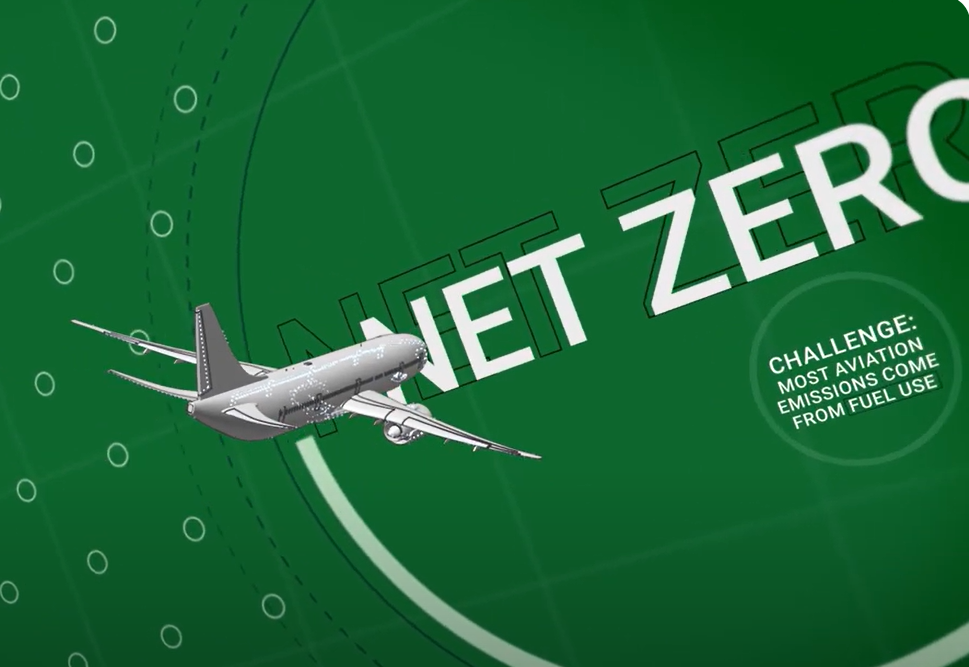 The main goal of the series is to raise awareness about the energy transition in the aviation sector and highlight the importance of mitigating greenhouse gas emissions, even though aviation currently accounts for only 2-3% of global emissions. According to a presentation by RSB Director Elena Schmidt, the key objective of the series is to "help navigate the world of sustainable aviation fuels," by clearly explaining how they work, the challenges involved, the projections for the future, and their development and use.
The main goal of the series is to raise awareness about the energy transition in the aviation sector and highlight the importance of mitigating greenhouse gas emissions, even though aviation currently accounts for only 2-3% of global emissions. According to a presentation by RSB Director Elena Schmidt, the key objective of the series is to "help navigate the world of sustainable aviation fuels," by clearly explaining how they work, the challenges involved, the projections for the future, and their development and use.
On the first day, the theme was SAF: The Future in Flight. The session was moderated by Hannah Walker, RSB's Director of Outreach & Engagement. The first presenter, Courtney Unruh, Director of SAF & Sustainability at Alaska Airlines, discussed the challenges of emission mitigation in the aviation sector. She explained that SAF is currently the main alternative, expected to account for 65% of emission reductions by 2050. This is followed by emission markets like CORSIA (Carbon Offsetting and Reduction Scheme for International Aviation), contributing 19%, new technologies in the sector 13%, changes in aircraft, and operational improvements such as route changes, 3%. For Alaska Airlines, the goal is to enhance all these areas to achieve carbon neutrality by 2040, with a significant focus on the use of SAF.
The second participant was Charlotte Hardenbol, Head of Sales & Marketing at SkyNRG. Her presentation focused on "What is Sustainable Aviation Fuel." SkyNRG is a producer of SAF and has been working in this field since 2011, when they supplied fuel for the first commercial flight using SAF. The company aims to help various stakeholders, including airlines, to mitigate aviation emissions by 2050, in line with the ICAO (International Civil Aviation Organization) agreement.
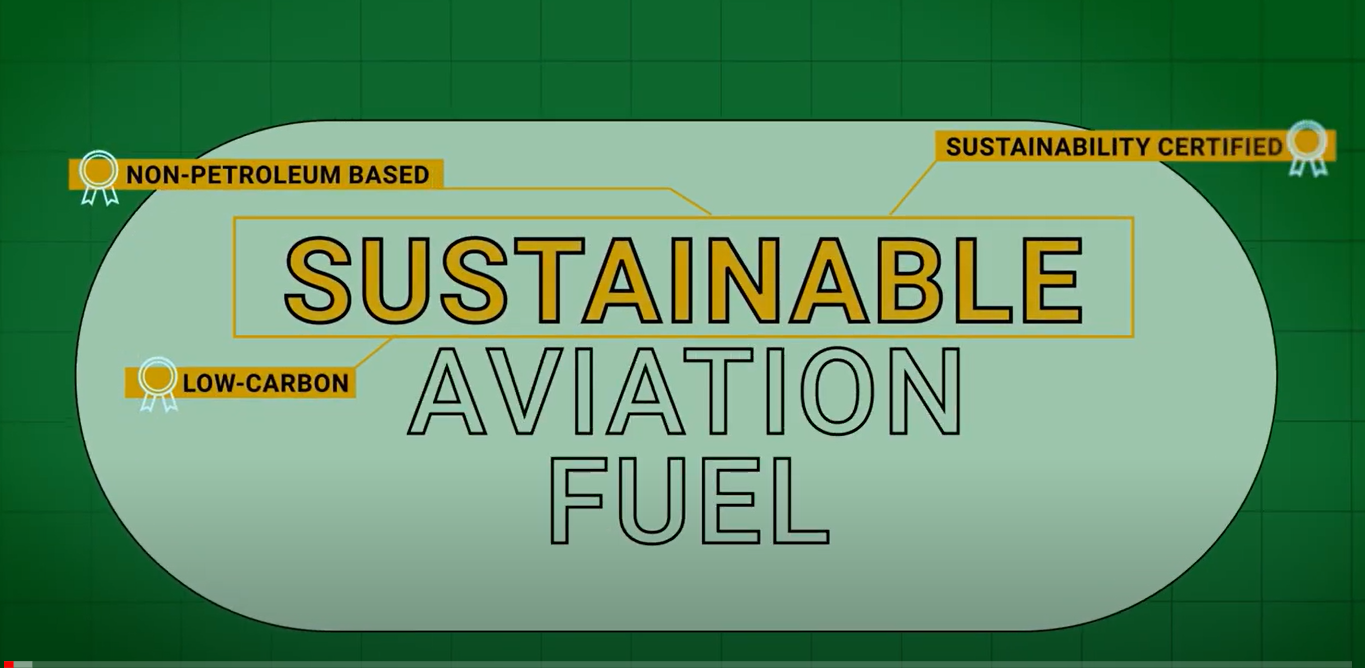 Hardenbol emphasized the necessity of reducing emissions in the aviation sector, especially as flight numbers increase, to prevent further rises in emissions. SAF is currently the most viable solution since other technologies, such as electric or hydrogen-powered aircraft, are still a long way off.
Hardenbol emphasized the necessity of reducing emissions in the aviation sector, especially as flight numbers increase, to prevent further rises in emissions. SAF is currently the most viable solution since other technologies, such as electric or hydrogen-powered aircraft, are still a long way off.
So far, more than 600,000 flights have used SAF, involving over 50 airlines worldwide, significantly contributing to emission reductions in the sector. The market, currently valued at 0.2 billion euros, has the potential to grow to 50 billion euros. By 2050, the target year for major international goals, could reach 500 billion euros, achieving net-zero emissions in civil aviation.
Regarding SAF production, Hardenbol explained that it can be made from various raw materials using different methods. The main types include:
- HEFA (Hydroprocessed Esters and Fatty Acids): Made by vegetable oils, animal fats, used cooking oils, the most commonly used currently is recycling used cooking oil. This technology is well-developed but still faces a shortage of raw materials;
- FT (Paraffinic Kerosene synthesized by Fischer-Tropsch): This pathway uses sources like urban, agricultural, and forestry solid waste biomass, as well as non-renewable raw materials like coal and natural gas. Same as HEFA, good technology, but the problem is raw materials;
- ATJ (Alcohol-to-Jet): Primarily uses ethanol made from biomass. This technology is advancing and has significant production potential;
- Power-to-Liquid (PtL): Involves carbon capture, with hydrogen use, to produce green and sustainable fuel. Although this technology still needs development, it has abundant raw material availability and is highly scalable.
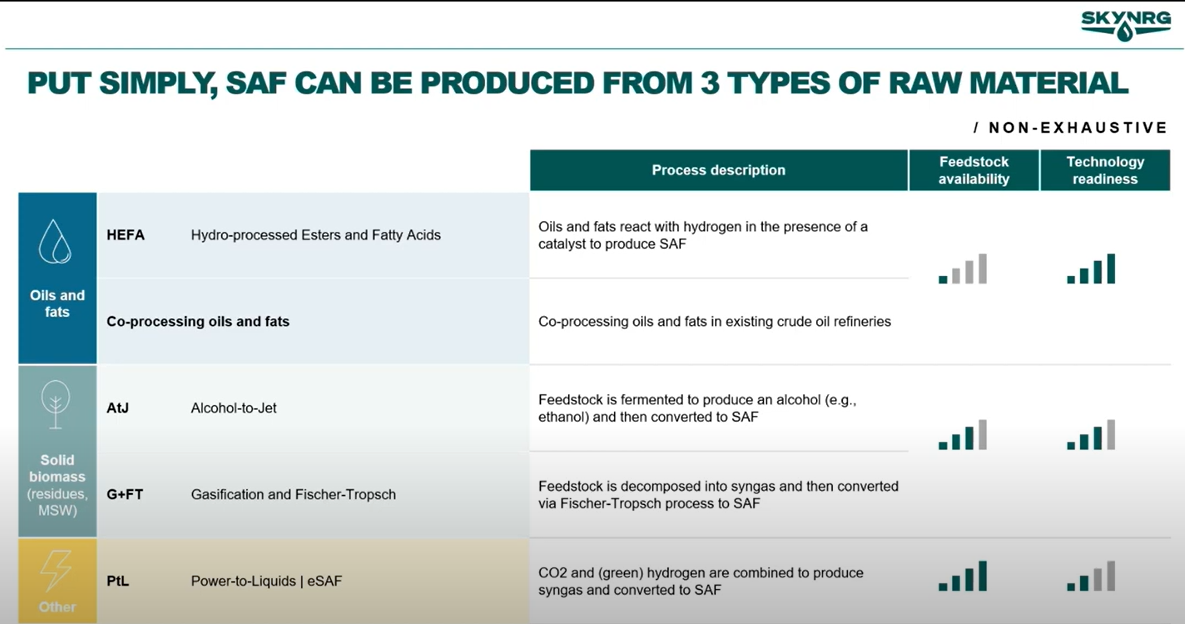 Hardenbol highlighted that advancing these technologies and expanding raw material sources are crucial for the future of SAF and achieving the ambitious targets set for 2050.
Hardenbol highlighted that advancing these technologies and expanding raw material sources are crucial for the future of SAF and achieving the ambitious targets set for 2050.
A central point in the presentation was to better understand the sustainability of SAF. In summary, Schmidt emphasized that while SAF still emits gasses, similar to those produced by fossil fuels when burned, there is a key difference. Unlike conventional aviation fuels, produced from fossil resources from underground which release stored carbon into the atmosphere, SAF is produced using alternative raw materials, described above. So, instead of using petroleum and its derivatives, it uses other options, including agricultural and forestry residues, even municipal waste. This means that the CO2 emitted during a flight is absorbed by the biomass used to produce SAF.
At the end of the presentation, Schmidt showed data on production in Europe and the United States, revealing possibilities for growth, especially with the use of the FT and ATJ pathways. However, she explained that this growth depends on more financial incentives and national policies. Currently, the main alternative is HEFA, although production remains limited in these countries and globally.
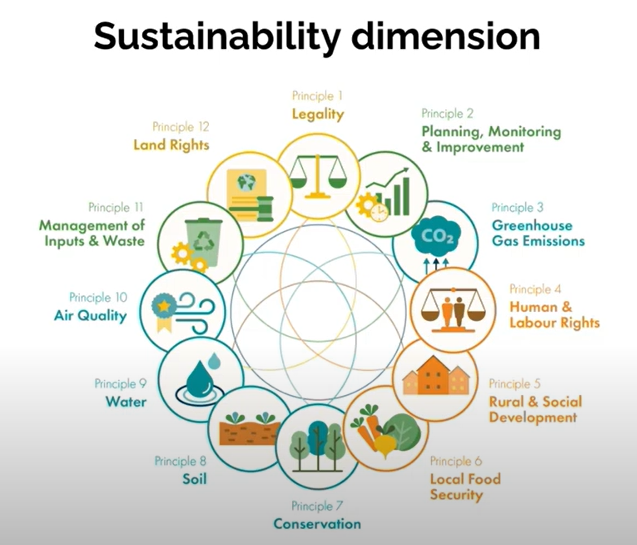 Continuing the discussion on SAF sustainability, the final presentation was given by Arianna Baldo, RSB's director on the subject. In her words, she focused on putting the "S" in SAF, explaining how and why it can be considered sustainable. Generally, as explained earlier, the entire production chain must aim to minimize or reduce emissions. Only then can a company prove that its fuel is clean and sustainable, obtain certification, and count the emission reductions toward its goals.
Continuing the discussion on SAF sustainability, the final presentation was given by Arianna Baldo, RSB's director on the subject. In her words, she focused on putting the "S" in SAF, explaining how and why it can be considered sustainable. Generally, as explained earlier, the entire production chain must aim to minimize or reduce emissions. Only then can a company prove that its fuel is clean and sustainable, obtain certification, and count the emission reductions toward its goals.
In other words, for SAF to be sustainable, its production must comply with various regulations throughout the entire supply chain. This includes avoiding the use of pesticides, diesel, and minimizing emissions during transport to the airport, for example. According to Baldo, for SAF to be certified as sustainable, it must demonstrate more than a 50% reduction in emissions across its production chain. The entire chain must undergo certification processes, and the certifying company must also be accredited to ensure the process's credibility and prevent CO² reductions double counting.
In the final moments, listeners had the opportunity to ask questions. The first question, about verification, was answered by Hardenbol. She explained the entire process of documenting the sustainability chain, demonstrating how it can be proven that the fuel is genuinely sustainable or SAF. This highlights the importance of companies like RSB for certification and ensuring authenticity.
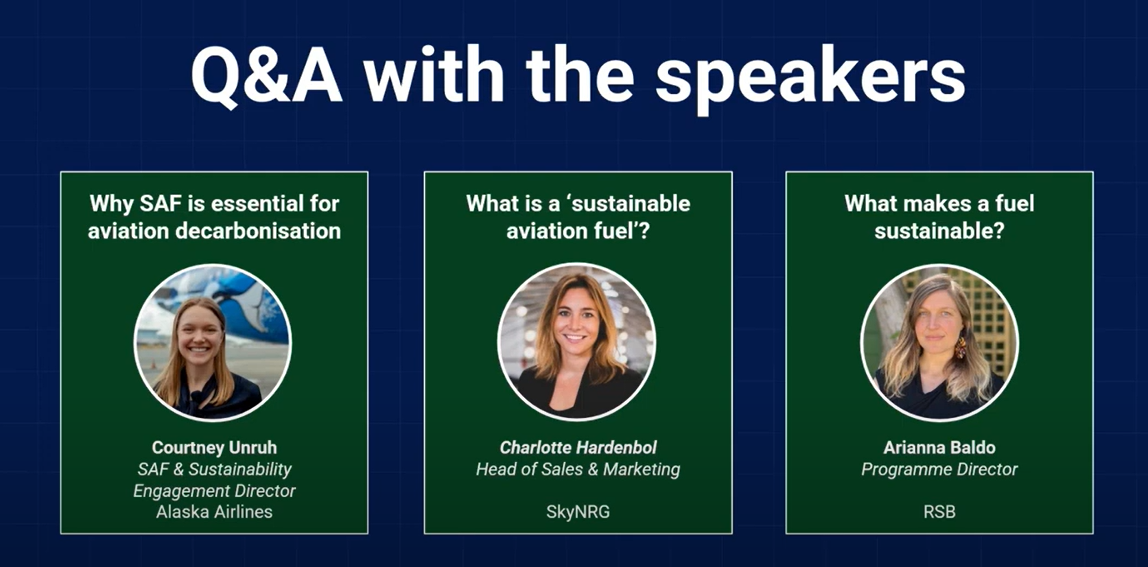 Next, there was a question about 100% SAF flights, which Unruh explained that such flights have already occurred, but they are still in the testing phase, primarily due to safety concerns. Additionally, the limited availability of SAF poses an obstacle, even at airports that do offer SAF, which are still few in number.
Next, there was a question about 100% SAF flights, which Unruh explained that such flights have already occurred, but they are still in the testing phase, primarily due to safety concerns. Additionally, the limited availability of SAF poses an obstacle, even at airports that do offer SAF, which are still few in number.
Following up on the SAF availability issue, Hardenbol emphasized that besides the lack of raw materials, there are logistical problems related to fuel distribution and the absence of SAF infrastructure at many airports. This underscores the importance of models like Book and Claim, which will be discussed in another webinar in the series, to advance SAF usage even in different locations where it is available. High costs are also linked to the limited availability, from raw material collection to production. Baldo pointed out that more incentives and policies from countries or local governments are needed to promote SAF and reduce prices, which are currently very restricted.
In response to my question about the difficulties other countries, such as Brazil, face in using SAF, all panelists agreed that political incentives, lack of raw materials, and especially infrastructure for the entire production chain—from raw material collection to aircraft refueling—are significant challenges. However, all agreed that additional incentive policies are needed, highlighting a notable disparity among nations.
In summary, the webinar was highly informative, greatly enhancing the understanding of what SAF is, how it works, and the current state of its production and use, primarily in developed countries like Europe and the USA. It also addressed sustainability throughout the entire chain and explained how certifications are conducted.
You can watch a recording of the event here: https://www.youtube.com/watch?v=iUY0lKDh7WI
*Post-doctoral researcher in Political Science at the Federal University of Goias, Brazil. Fellow of CNPQ and FAPEG jeffersonestevo@ufg.br
Nearly 55,000 articles in our online library!
Use the categories and tags listed below to access the nearly 50,000 articles indexed on this website.
Advanced Biofuels USA Policy Statements and Handouts!
- For Kids: Carbon Cycle Puzzle Page
- Why Ethanol? Why E85?
- Just A Minute 3-5 Minute Educational Videos
- 30/30 Online Presentations
- “Disappearing” Carbon Tax for Non-Renewable Fuels
- What’s the Difference between Biodiesel and Renewable (Green) Diesel? 2020 revision
- How to De-Fossilize Your Fleet: Suggestions for Fleet Managers Working on Sustainability Programs
- New Engine Technologies Could Produce Similar Mileage for All Ethanol Fuel Mixtures
- Action Plan for a Sustainable Advanced Biofuel Economy
- The Interaction of the Clean Air Act, California’s CAA Waiver, Corporate Average Fuel Economy Standards, Renewable Fuel Standards and California’s Low Carbon Fuel Standard
- Latest Data on Fuel Mileage and GHG Benefits of E30
- What Can I Do?
Donate
DonateARCHIVES
- February 2026
- January 2026
- December 2025
- November 2025
- October 2025
- September 2025
- August 2025
- July 2025
- June 2025
- May 2025
- April 2025
- March 2025
- February 2025
- January 2025
- December 2024
- November 2024
- October 2024
- September 2024
- August 2024
- July 2024
- June 2024
- May 2024
- April 2024
- March 2024
- February 2024
- January 2024
- December 2023
- November 2023
- October 2023
- September 2023
- August 2023
- July 2023
- June 2023
- May 2023
- April 2023
- March 2023
- February 2023
- January 2023
- December 2022
- November 2022
- October 2022
- September 2022
- August 2022
- July 2022
- June 2022
- May 2022
- April 2022
- March 2022
- February 2022
- January 2022
- December 2021
- November 2021
- October 2021
- September 2021
- August 2021
- July 2021
- June 2021
- May 2021
- April 2021
- March 2021
- February 2021
- January 2021
- December 2020
- November 2020
- October 2020
- September 2020
- August 2020
- July 2020
- June 2020
- May 2020
- April 2020
- March 2020
- February 2020
- January 2020
- December 2019
- November 2019
- October 2019
- September 2019
- August 2019
- July 2019
- June 2019
- May 2019
- April 2019
- March 2019
- February 2019
- January 2019
- December 2018
- November 2018
- October 2018
- September 2018
- August 2018
- July 2018
- June 2018
- May 2018
- April 2018
- March 2018
- February 2018
- January 2018
- December 2017
- November 2017
- October 2017
- September 2017
- August 2017
- July 2017
- June 2017
- May 2017
- April 2017
- March 2017
- February 2017
- January 2017
- December 2016
- November 2016
- October 2016
- September 2016
- August 2016
- July 2016
- June 2016
- May 2016
- April 2016
- March 2016
- February 2016
- January 2016
- December 2015
- November 2015
- October 2015
- September 2015
- August 2015
- July 2015
- June 2015
- May 2015
- April 2015
- March 2015
- February 2015
- January 2015
- December 2014
- November 2014
- October 2014
- September 2014
- August 2014
- July 2014
- June 2014
- May 2014
- April 2014
- March 2014
- February 2014
- January 2014
- December 2013
- November 2013
- October 2013
- September 2013
- August 2013
- July 2013
- June 2013
- May 2013
- April 2013
- March 2013
- February 2013
- January 2013
- December 2012
- November 2012
- October 2012
- September 2012
- August 2012
- July 2012
- June 2012
- May 2012
- April 2012
- March 2012
- February 2012
- January 2012
- December 2011
- November 2011
- October 2011
- September 2011
- August 2011
- July 2011
- June 2011
- May 2011
- April 2011
- March 2011
- February 2011
- January 2011
- December 2010
- November 2010
- October 2010
- September 2010
- August 2010
- July 2010
- June 2010
- May 2010
- April 2010
- March 2010
- February 2010
- January 2010
- December 2009
- November 2009
- October 2009
- September 2009
- August 2009
- July 2009
- June 2009
- May 2009
- April 2009
- March 2009
- February 2009
- January 2009
- December 2008
- November 2008
- October 2008
- September 2008
- August 2008
- July 2008
- June 2008
- May 2008
- April 2008
- March 2008
- February 2008
- January 2008
- December 2007
- November 2007
- October 2007
- September 2007
- August 2007
- June 2007
- February 2007
- January 2007
- October 2006
- April 2006
- January 2006
- April 2005
- December 2004
- November 2004
- December 1987
CATEGORIES
- About Us
- Advanced Biofuels Call to Action
- Aviation Fuel/Sustainable Aviation Fuel (SAF)
- BioChemicals/Renewable Chemicals
- BioRefineries/Renewable Fuel Production
- Business News/Analysis
- Cooking Fuel
- Education
- 30/30 Online Presentations
- Competitions, Contests
- Earth Day 2021
- Earth Day 2022
- Earth Day 2023
- Earth Day 2024
- Earth Day 2025
- Executive Training
- Featured Study Programs
- Instagram TikTok Short Videos
- Internships
- Just a Minute
- K-12 Activities
- Mechanics training
- Online Courses
- Podcasts
- Scholarships/Fellowships
- Teacher Resources
- Technical Training
- Technician Training
- University/College Programs
- Events
- Coming Events
- Completed Events
- More Coming Events
- Requests for Speakers, Presentations, Posters
- Requests for Speakers, Presentations, Posters Completed
- Webinars/Online
- Webinars/Online Completed; often available on-demand
- Federal Agency/Executive Branch
- Agency for International Development (USAID)
- Agriculture (USDA)
- Commerce Department
- Commodity Futures Trading Commission
- Congressional Budget Office
- Defense (DOD)
- Air Force
- Army
- DARPA (Defense Advance Research Projects Agency)
- Defense Logistics Agency
- Marines
- Navy
- Education Department
- Energy (DOE)
- Environmental Protection Agency
- Federal Energy Regulatory Commission (FERC)
- Federal Reserve System
- Federal Trade Commission
- Food and Drug Administration
- General Services Administration
- Government Accountability Office (GAO)
- Health and Human Services (HHS)
- Homeland Security
- Housing and Urban Development (HUD)
- Interior Department
- International Trade Commission
- Joint Office of Energy and Transportation
- Justice (DOJ)
- Labor Department
- National Academies of Sciences Engineering Medicine
- National Aeronautics and Space Administration
- National Oceanic and Atmospheric Administration
- National Research Council
- National Science Foundation
- National Transportation Safety Board (NTSB)
- Occupational Safety and Health Administration
- Overseas Private Investment Corporation
- Patent and Trademark Office
- Securities and Exchange Commission
- State Department
- Surface Transportation Board
- Transportation (DOT)
- Federal Aviation Administration
- National Highway Traffic Safety Administration (NHTSA)
- Pipeline and Hazardous Materials Safety Admin (PHMSA)
- Treasury Department
- U.S. Trade Representative (USTR)
- White House
- Federal Legislation
- Federal Litigation
- Federal Regulation
- Feedstocks
- Agriculture/Food Processing Residues nonfield crop
- Alcohol/Ethanol/Isobutanol
- Algae/Other Aquatic Organisms/Seaweed
- Atmosphere
- Carbon Dioxide (CO2)
- Field/Orchard/Plantation Crops/Residues
- Forestry/Wood/Residues/Waste
- hydrogen
- Manure
- Methane/Biogas
- methanol/bio-/renewable methanol
- Not Agriculture
- RFNBO (Renewable Fuels of Non-Biological Origin)
- Seawater
- Sugars
- water
- Funding/Financing/Investing
- grants
- Green Jobs
- Green Racing
- Health Concerns/Benefits
- Heating Oil/Fuel
- History of Advanced Biofuels
- Infrastructure
- Aggregation
- Biofuels Engine Design
- Biorefinery/Fuel Production Infrastructure
- Carbon Capture/Storage/Use
- certification
- Deliver Dispense
- Farming/Growing
- Precursors/Biointermediates
- Preprocessing
- Pretreatment
- Terminals Transport Pipelines
- International
- Abu Dhabi
- Afghanistan
- Africa
- Albania
- Algeria
- Angola
- Antarctica
- Arctic
- Argentina
- Armenia
- Aruba
- Asia
- Asia Pacific
- Australia
- Austria
- Azerbaijan
- Bahamas
- Bahrain
- Bangladesh
- Barbados
- Belarus
- Belgium
- Belize
- Benin
- Bermuda
- Bhutan
- Bolivia
- Bosnia and Herzegovina
- Botswana
- Brazil
- Brunei
- Bulgaria
- Burkina Faso
- Burundi
- Cambodia
- Cameroon
- Canada
- Canary Islands
- Caribbean
- Central African Republic
- Central America
- Chad
- Chile
- China
- Colombia
- Congo
- Congo, Democratic Republic of
- Costa Rica
- Croatia
- Cuba
- Cyprus
- Czech Republic
- Denmark
- Dominican Republic
- Dubai
- Ecuador
- Egypt
- El Salvador
- Equatorial Guinea
- Estonia
- Eswatini/Swaziland
- Ethiopia
- European Union (EU)
- Fiji
- Finland
- France
- French Guiana
- Gabon
- Georgia
- Germany
- Ghana
- Global South
- Greece
- Greenland
- Grenada
- Guatemala
- Guinea
- Guyana
- Haiti
- Honduras
- Hong Kong
- Hungary
- Iceland
- India
- Indonesia
- Iran
- Iraq
- Ireland
- Israel
- Italy
- Ivory Coast
- Jamaica
- Japan
- Jersey
- Jordan
- Kazakhstan
- Kenya
- Korea
- Kosovo
- Kuwait
- Laos
- Latin America
- Latvia
- Lebanon
- Liberia
- Lithuania
- Luxembourg
- Macedonia
- Madagascar
- Malawi
- Malaysia
- Maldives
- Mali
- Malta
- Marshall Islands
- Mauritania
- Mauritius
- Mexico
- Middle East
- Moldova
- Monaco
- Mongolia
- Morocco
- Mozambique
- Myanmar/Burma
- Namibia
- Nepal
- Netherlands
- New Guinea
- New Zealand
- Nicaragua
- Niger
- Nigeria
- North Africa
- North America
- North Korea
- Northern Ireland
- Norway
- Oman
- Pakistan
- Panama
- Papua New Guinea
- Paraguay
- Peru
- Philippines
- Poland
- Portugal
- Qatar
- Republic of
- Romania
- Russia
- Rwanda
- Saudi Arabia
- Scotland
- Senegal
- Serbia
- Sierra Leone
- Singapore
- Slovakia/Slovak Republic
- Slovenia
- Solomon Islands
- South Africa
- South America
- South Korea (Republic of Korea)
- South Sudan
- Southeast Asia
- Spain
- Sri Lanka
- Sudan
- Suriname
- Sweden
- Switzerland
- Taiwan
- Tanzania
- Thailand
- Timor-Leste
- Togo
- Trinidad and Tobago
- Tunisia
- Turkey
- Uganda
- UK (United Kingdom)
- Ukraine
- United Arab Emirates UAE
- Uruguay
- Uzbekistan
- Vatican
- Venezuela
- Vietnam
- Wales
- Zambia
- Zanzibar
- Zimbabwe
- Marine/Boat Bio and Renewable Fuel/MGO/MDO/SMF
- Marketing/Market Forces and Sales
- Opinions
- Organizations
- Original Writing, Opinions Advanced Biofuels USA
- Policy
- Presentations
- Biofuels Digest Conferences
- DOE Conferences
- Bioeconomy 2017
- Bioenergy2015
- Biomass2008
- Biomass2009
- Biomass2010
- Biomass2011
- Biomass2012
- Biomass2013
- Biomass2014
- DOE Project Peer Review
- Other Conferences/Events
- R & D Focus
- Carbon Capture/Storage/Use
- Co-Products
- Feedstock
- Logistics
- Performance
- Process
- Vehicle/Engine/Motor/Aircraft/Boiler/Ship
- Yeast
- Railroad/Train/Locomotive Fuel
- Resources
- Books Web Sites etc
- Business
- Definition of Advanced Biofuels
- Find Stuff
- Government Resources
- Scientific Resources
- Technical Resources
- Tools/Decision-Making
- Rocket/Missile Fuel
- Sponsors
- States
- Alabama
- Alaska
- Arizona
- Arkansas
- California
- Colorado
- Connecticut
- Delaware
- Florida
- Georgia
- Hawai'i
- Idaho
- Illinois
- Indiana
- Iowa
- Kansas
- Kentucky
- Louisiana
- Maine
- Maryland
- Massachusetts
- Michigan
- Midwest
- Minnesota
- Mississippi
- Missouri
- Montana
- Native American tribal nation lands
- Nebraska
- Nevada
- New Hampshire
- New Jersey
- New Mexico
- New York
- North Carolina
- North Dakota
- Ohio
- Oklahoma
- Oregon
- Pennsylvania
- Puerto Rico
- Rhode Island
- South Carolina
- South Dakota
- Tennessee
- Texas
- Utah
- Vermont
- Virginia
- Washington
- Washington DC
- West Coast
- West Virginia
- Wisconsin
- Wyoming
- Sustainability
- Uncategorized
- What You Can Do
tags
© 2008-2023 Copyright Advanced BioFuels USA. All Rights reserved.
.jpg)





Comments are closed.